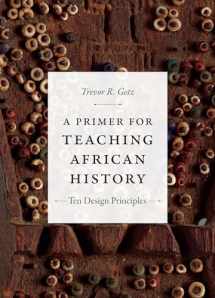
A Primer for Teaching African History: Ten Design Principles (Design Principles for Teaching History)
ISBN-13:
9780822369820
ISBN-10:
0822369826
Author:
Trevor R. Getz
Publication date:
2018
Publisher:
Duke University Press Books
Format:
Paperback
184 pages
Category:
African History
,
World History
,
Higher & Continuing Education
FREE US shipping
Book details
ISBN-13:
9780822369820
ISBN-10:
0822369826
Author:
Trevor R. Getz
Publication date:
2018
Publisher:
Duke University Press Books
Format:
Paperback
184 pages
Category:
African History
,
World History
,
Higher & Continuing Education
Summary
A Primer for Teaching African History: Ten Design Principles (Design Principles for Teaching History) (ISBN-13: 9780822369820 and ISBN-10: 0822369826), written by authors
Trevor R. Getz, was published by Duke University Press Books in 2018.
With an overall rating of 3.9 stars, it's a notable title among other
African History
(World History, Higher & Continuing Education) books. You can easily purchase or rent A Primer for Teaching African History: Ten Design Principles (Design Principles for Teaching History) (Paperback, Used) from BooksRun,
along with many other new and used
African History
books
and textbooks.
And, if you're looking to sell your copy, our current buyback offer is $0.73.
Description
A Primer for Teaching African History is a guide for college and high school teachers who are teaching African history for the first time, for experienced teachers who want to reinvigorate their courses, for those who are training future teachers to prepare their own syllabi, and for teachers who want to incorporate African history into their world history courses. Trevor R. Getz offers design principles aimed at facilitating a classroom experience that will help students navigate new knowledge, historical skills, ethical development, and worldviews. He foregrounds the importance of acknowledging and addressing student preconceptions about Africa, challenging chronological approaches to history, exploring identity and geography as ways to access historical African perspectives, and investigating the potential to engage in questions of ethics that studying African history provides. In his discussions of setting goals, pedagogy, assessment, and syllabus design, Getz draws readers into the process of thinking consciously and strategically about designing courses on African history that will challenge students to think critically about Africa and the discipline of history.


We would LOVE it if you could help us and other readers by reviewing the book
Book review

Congratulations! We have received your book review.
{user}
{createdAt}
by {truncated_author}



